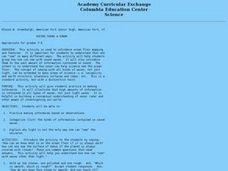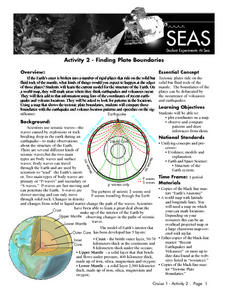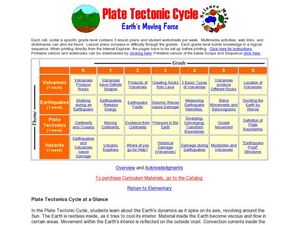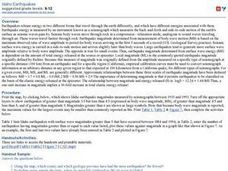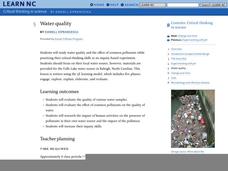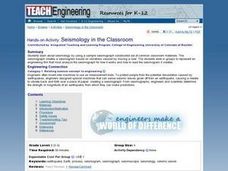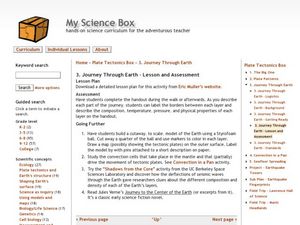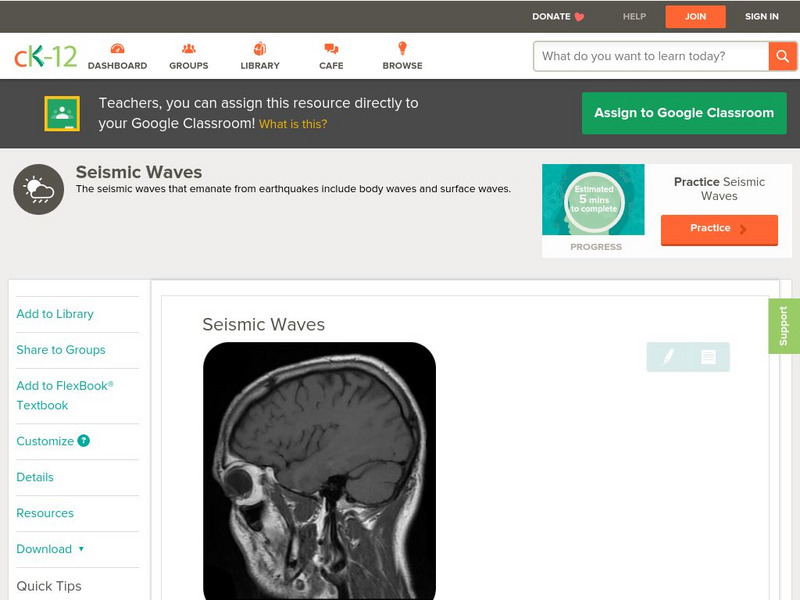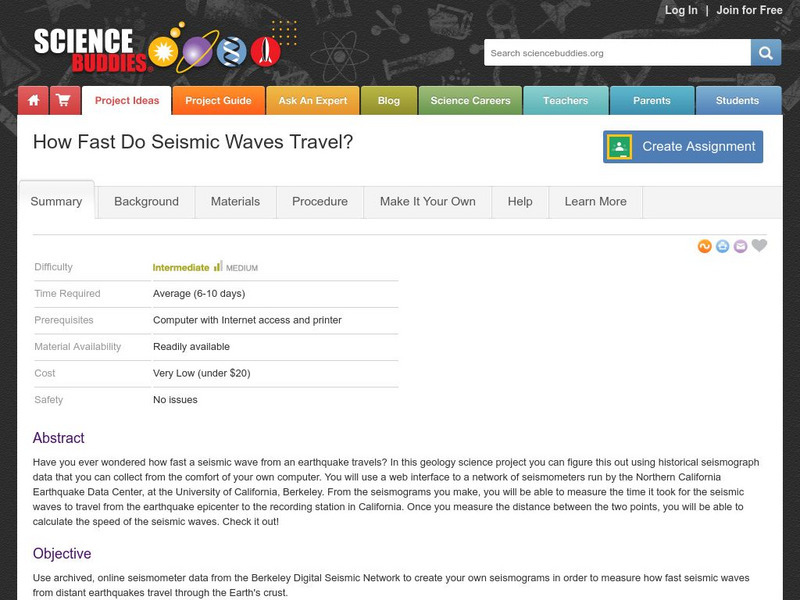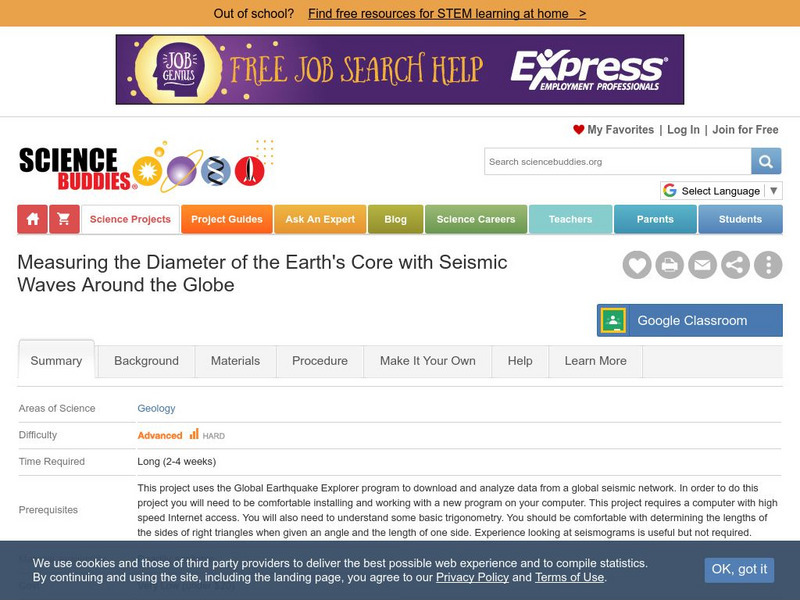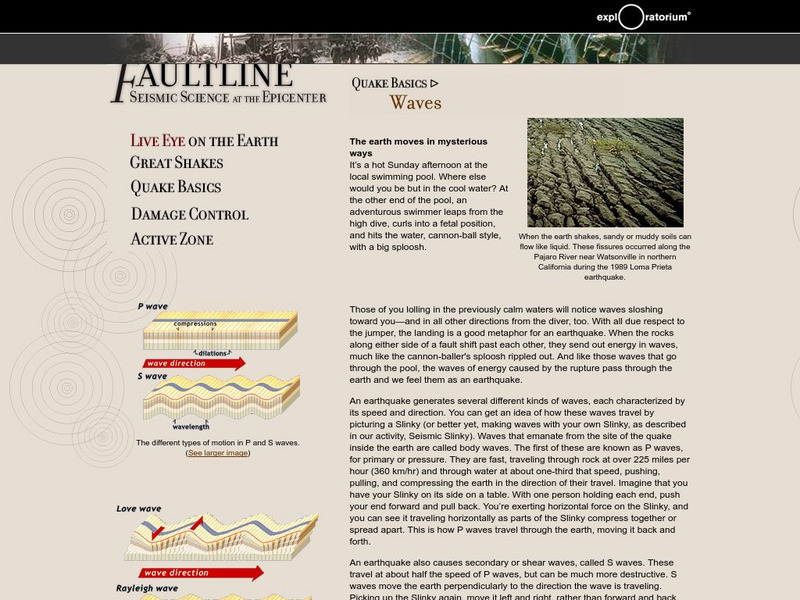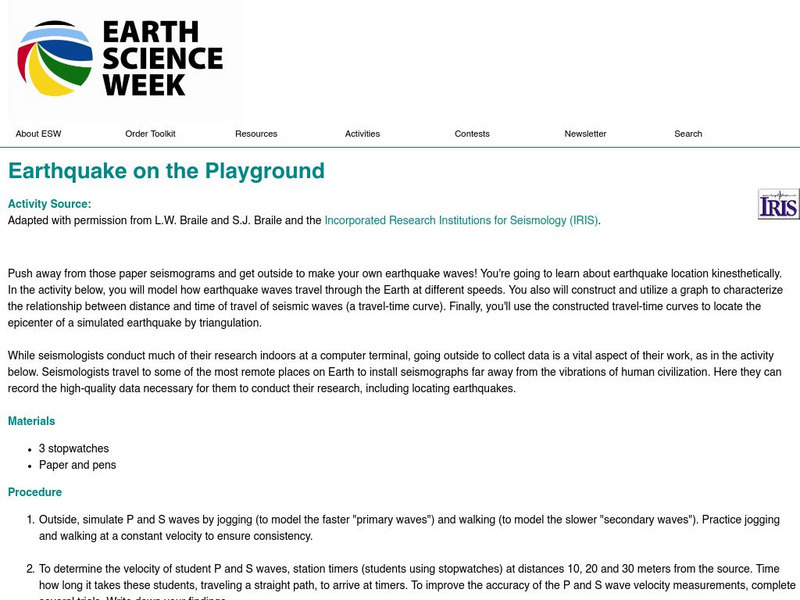Curated OER
Seeing Sound and Sonar
Young scholars grasp how underwater animals can "see" using sound waves. They practice making inferences, and build a conceptual understanding of sonar radar.
Curated OER
Earthquakes
After reading an article on earthquakes and tsunamis, students answer a series of multiple choice questions about what they have learned. All answers can be found within the article, making this a good way to prepare for reading...
Curated OER
Recent Volcanoes And Earthquakes:
Learners investigate the current model for the structure of the Earth. On a world map, they mark areas where they think earthquakes and volcanoes occur and compare those areas with earthquake and volcano location patterns.
Curated OER
Simple Machines: The Wede & Lever
Students describe how wedge and lever makes work easier. In this physics lesson plan, students analyze experimental data by creating a graph to see the trends. They calculate the work done and mechanical advantage of these simple machines.
Curated OER
Plate Tectonic Cycle
Students explore the Earth's movements by completing worksheets. In this plate tectonics lesson, students define such natural disasters as volcanoes, earthquakes, tsunamis and mudslides and discuss their connections to plate tectonics....
Curated OER
Earthquake Power
In this earthquakes worksheet, students learn about the measurements of earthquakes on the Richter scale. They answer six questions about the magnitudes and sizes of earthquakes using two tables of data about earthquakes and the Richter...
Curated OER
Tomography
In this tomography activity, students read about how tomography is used to help oceanographers learn more about the Earth's surface below the ocean. Students complete 3 short answer questions based on the reading.
Curated OER
Idaho Earthquakes
Students examine the types of earthquakes that occur in Idaho. In groups, they compare and contrast the types of energy released and how they affect the movement of the Earth. To end the activity, they analyze a map showing the...
Curated OER
Finding an Earthquake's Epicenter
High schoolers examine the process used to identify the epicenter of an earthquake. They identify the Richter scale and interpret a seismograph reading. They also view photographs of the aftermath of earthquakes.
Curated OER
Chemical and Physical Changes
Eighth graders investigate different gas behaviors. In this chemistry lesson plan, 8th graders describe how changing volume and temperature affect gas particles motion. They collect data and make a generalization about these variables'...
Curated OER
Water Quality
Students analyze water quality and turbidity of collected samples. In this physics lesson, students conduct tests to identify the suspended particles in the samples. They explain how human activities affect water quality.
Curated OER
Seismology in the Classroom
Students work together to use a sample seismograph. They role play the position of an engineering firm that is to analyze the machine. They discover how engineers develop new machines to take measurements.
Curated OER
Journey Through Earth
Young scholars study plate tectonics. In this plate tectonics instructional activity students build a cutaway scale model of the Earth.
Curated OER
Destruction by Earthquakes
In this earthquakes worksheet, students review terms associated with earthquakes such as Richter scale, seismographs, and the Moho scale. This worksheet has 10 fill in the blank questions.
Curated OER
OCEAN TSUNAMI
Students research the concept of a tsunami in detail and the implications of its effect upon a seashore is considered. The causes of a tsunami are investigated and compared with each other.
Curated OER
Circles
Tenth graders explore and define the radius and diameter of a circle. In this geometry lesson, 10th graders calculate the circumference and area of a circle using real world objects and shapes. They discuss chords and lines tangent...
CK-12 Foundation
Ck 12: Earth Science: Seismic Waves
[Free Registration/Login may be required to access all resource tools.] The seismic waves that emanate from earthquakes include body waves and surface waves. Learn how scientists use seismic waves to learn about the Earth's interior.
Science Buddies
Science Buddies: How Fast Do Seismic Waves Travel?
Here's a geology project that uses historical seismograph data that you can collect from the comfort of your own computer. You'll use a web interface to a network of seismometers run by the Northern California Earthquake Data Center, at...
CK-12 Foundation
Ck 12: Earth Science: Seismic Waves Study Guide
[Free Registration/Login may be required to access all resource tools.] This study guide summarizes key points about types of seismic waves. Includes a few questions to check for understanding.
CK-12 Foundation
Ck 12: Earth Science: Seismic Waves From Earthquakes
[Free Registration/Login may be required to access all resource tools.] The signs scientists might see prior to an earthquake occurring.
Exploratorium
Exploratorium: The Faultline/seismic Slinky
A lesson plan for investigating longitudinal waves by use of a Slinky toy. Directions, questions, and applications to seismic waves are provided.
Science Buddies
Science Buddies: Measuring the Earth's Core With Seismic Waves
When an earthquake occurs, seismic shock waves travel out through the earth from the source of the event. The shock waves travel through the earth (body waves), or along the Earth's surface (surface waves), and can be recorded at remote...
Exploratorium
Exploratorium: Faultline: P and S Waves
The different types of earthquake waves are discussed and illustrated. Features geologist video clip.
American Geosciences Institute
American Geosciences Institute: Earth Science Week: Earthquake on the Playground
In this experiment, students go outside and create a simulation of P and S waves traveling across a 30-meter span. This is repeated using a 30-meter square. They experiment with P and S wave behavior, record results, and use...


